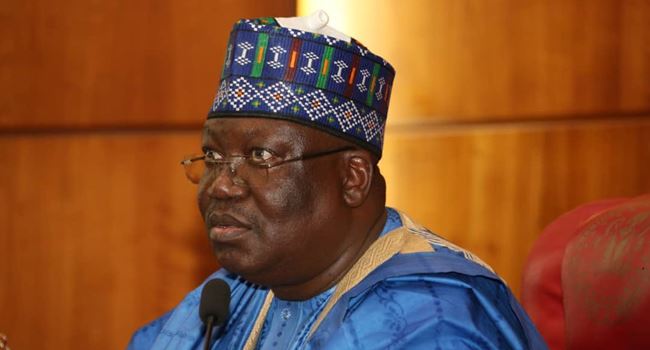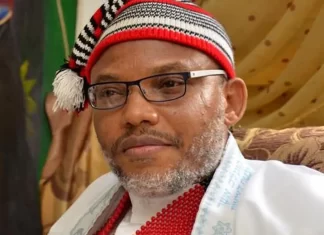Smuggling of petroleum products has been blamed for the rise in payments for subsidy, the reason FG wants it scrapped
The President of the Senate, Ahmad Lawan on Tuesday met with heads of security and paramilitary agencies and tasked them to do more to checkmate smuggling of petroleum products out of Nigeria.
A statement by the Special Adviser to the President of the Senate on Media, Ola Awoniyi, said in attendance at the meeting were the Comptroller General of Nigerian Customs Service, Col. Hameed Ali(rtd), Commandant General, Nigerian Civil Defence Corps, Ahmed Abubakar Audi, representative of the Director-General of the State Security Service, San Gesto and representative of the Comptroller General of Nigerian Correctional Service, Haliru Ishaka Abdulmumini.
Lawan said in his opening remarks that the meeting was a follow up to the Monday meeting with Finance and Petroleum Ministers which was to find a way forward on the administration and management of fuel subsidy in Nigeria.
READ ALSO
Senate sharpens corruption fight with witness protection bill
The Senate President told his guests: “We are all aware that some of the products particularly the PMS is smuggled out and yet we paid subsidy on what is smuggled out.
“So this meeting is to look into the ways and means of controlling the smuggling of the petroleum products with a view to minimising the cost of fuel subsidy to our country.
“I know individually, these organisations have been carrying out their responsibilities on this but I think that we are coming into a special moment. Our situation is such that we cannot afford anymore to allow this smuggling business to continue because the cost is very huge and debilitating to our people.
“At a point, I will hold a meeting with the National Security Adviser who is supposed to coordinate the entire security apparatus for protecting our borders.
“I will also hold some engagement with the military, especially the Navy because a lot of our products are shipped out to other countries through the waterways.
“At the end of the day what we hope to achieve is to minimise or where possible eliminate the incidents of smuggling of petroleum products that we import into the country for our people.
“The figures of what we consume in the country continue to fluctuate. At one point it was almost 100 million litres per day and surely this is difficult to believe that we consume almost 100 million litres per day within our borders. Certainly, a good percentage of it goes out.
“This will be the first engagement but certainly this is not the last. We need to look at the strategy, maybe how we undertake our activities at the borders, the different agencies, the inter-agency cooperation that is so essential between the agencies. The application of technology in surveillance and who should host that technology.
“I believe there is a need for deployment of drones and other technologies that are available these days and probably the office of the National Security Adviser should be able to be in charge of that and make the information and data available to all the agencies that need them.
“I believe at one point, we will need the participation of the NCC is the major Institution in our country in charge of the enhancement of technology, the ICT particularly.
“I want to assure you this is going to be a special partnership between the National Assembly and the executive arm of government because today’s situation demands that we do things differently.
“Our Committees in the Senate that supervise the Customs, the security agencies, will be up to date with their oversight. We need to see in the next six months, what different strategies will bring to us.
“We want to see also our citizens participating in the surveillance. We have to mobilise our citizens especially those at the borders. That when they see trucks conveying petroleum products to our neighbouring countries, they should not only say something, they should say it to those who need to know. And that is to our security agencies.
“So we need to mobilise our citizens as well because this is something that affects all of us. Not about government. And anyway, the government is about the people.
“What we are trying to do is to reduce the level of smuggling of petroleum products out of Nigeria and that will translate into reducing the bill that we pay as petroleum subsidy.”
Responding, the Comptroller General of the Nigerian Customs Service, Col. Hameed Ali said his agency had been doing a lot in trying to ensure that the smuggling of petroleum products out of Nigeria was minimised to the bearest level.
He however complained of porous borders and the absence of governance at the border communities which made their job difficult.
“Let me say here generally speaking, that we have a porous border. You also know we do not have all those equipment you have made mention of in ensuring the surveillance of our borders.
“And one more critical thing is that, within our border communities, there is no presence of governance. Our border communities completely lack the presence of governance.
“Therefore, those of us who are shouldered with the responsibility of ensuring that we gatekeep, we find it difficult because the ordinary man in Some border does not see the reason why he should be compliant, does not see the reason why he should work with the security in Nigeria to protect the border.
“This is simply because there is no presence of governance. In some areas, this border community cross to another country to get basic amenities,” Ali said.














